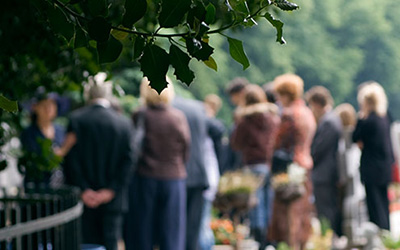You are here
- Home
- Develop
- My Knowledge
- Introduction to death and dying
Introduction to death and dying
 What is death?
What is death?
Put simply and biologically death is the permanent cessation of all biological functions that sustain a living organism although, of course, it is a great deal more than this in terms of its impact on others.
Why is it important to consider death and dying?
Dying does not take place in a social and physical vacuum. For example, it has implications for the way in which dying is managed. When dying takes place in a public, open and visible space such as a hospital, or a section of a hospital such as the intensive care setting, an individual's experience becomes a communal issue and a public administrative matter. So the management and understanding of dying is important.
How do we cope with death and dying?
According to Kubler-Ross (1969) there are five stages, denial, anger, bargaining, depression and acceptance are a part of the framework that makes up our learning to live without the one we have lost. They are tools to help us frame and identify what we may be feeling. Not everyone goes through all of them or in a prescribed order.
1. Denial
This first stage of grieving helps us to survive the loss. In this stage, the world becomes meaningless and overwhelming. Life makes no sense. We are in a state of shock and denial. Denial and shock help us to cope and make survival possible. Denial helps us to pace our feelings of grief. As you accept the reality of the loss and start to ask yourself questions, you are unknowingly beginning the healing process. You are becoming stronger, and the denial is beginning to fade. But as you proceed, all the feelings you were denying begin to surface.
2. Anger
Anger is a necessary stage of the healing process. It is important to feel your anger, even though it may seem endless. The more you truly feel it, the more it will begin to dissipate and the more you will heal. We usually know more about suppressing anger than feeling it. The anger is just another indication of the intensity of your love.
3. Bargaining
Before a loss, it seems like you will do anything if only your loved one would be spared. We want life returned to what it was; we want our loved one restored. We want to go back in time. Guilt is often bargaining’s companion. We will do anything not to feel the pain of this loss. We remain in the past, trying to negotiate our way out of the hurt. People often think of the stages as lasting weeks or months. They forget that the stages are responses to feelings that can last for minutes or hours as we flip in and out of one and then another.
4. Depression
After bargaining, our attention moves into the present. Empty feelings present themselves, and grief enters our lives on a deeper level, deeper than we ever imagined. This depressive stage feels as though it will last forever. It’s important to understand that this depression is not a sign of mental illness. It is the appropriate response to a great loss. The loss of a loved one is a very depressing situation, and depression is a normal and appropriate response. To not experience depression after a loved one dies would be unusual.
5. Acceptance
This stage is about accepting the reality that our loved one is physically gone and recognizing that this new reality is the permanent reality. We will never like this reality or make it OK, but eventually we accept it. We learn to live with it. It is the new norm with which we must learn to live. We may start to reach out to others and become involved in their lives. We invest in our friendships and in our relationship with ourselves.
Learn more about death and dying
Our free Living with death and dying course explores how knowledge and beliefs about death and encounters with death affect people’s lives. It also examines the concept of a ‘good death’ from an individual perspective in order to enhance the quality of dying.
We also offer a more detailed short course called Improving End-of-Life care, which focuses specifically on improving end-of-life care for adults.
OU students can also sign up for our Death, dying and bereavement 60 credit module which explores the social context of death and dying, considering the impact on end of life care and bereavement support. This module is particularly relevant to those working with dying people and their families, or anyone who wants to find out more about death, dying and bereavement.
Further information on death and dying
Cruse provides help and information on Death and Dying as well as training and a National helpline. See Cruse Bereavement Care and resources for when someone dies on the Marie Curie website.
Healthcare professionals should watch the Elizabeth Kubler-Ross Last interview on death and dying via YouTube.
